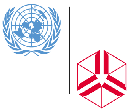
network of research and training centres and programmes
Issue 16: May 2002
 |
UNU Update | |
| The newsletter of United Nations
University and its network of research and training centres and programmes |
||
|
Issue 16: May 2002 |
||
|
More research needed on crop yield, says INTECH report While commercial proponents stress the potential contribution of
genetically modified (GM) plants in “feeding the world,” only about
one-quarter of field tests in the US and 12.5 per cent in the European
Union relate directly to crop yield, according to an analysis by the UN
University Institute for New
Technologies (UNU/INTECH). Seven
in 10 GM tests are being conducted on herbicide tolerance and pest
resistance. Anthony Arundel, of the University of Maastricht in the
Netherlands, in an analysis published by INTECH, shows 69 per cent of US
and 71 per cent of EU trials on GM plants relate to herbicide tolerance
and pest resistance. In the US, 63 per cent of the latter are for insect
resistance, 21 per cent are for viruses, 12.7 per cent for fungi, and 3.3
per cent for other pests, including bacteria. While improved pest resistance would contribute to crop yields,
the analysis shows just 27.8 per cent of US and 12.5 per cent of EU trials
with GM plants concern yield directly (in total, these account for only
1.1 per cent of all US and EU field trials combined), considered the most
important improvement needed if the food requirements of developing
countries are to be met.
“The benefits of agricultural biotechnology to developing
countries – one of its main public selling points – will require
development of stress resistant crops and new types of crops adapted to
tropical climates,” according to INTECH director Lynn Mytelka.
“Such crops are a long way from market given the relatively slow
pace of testing in these areas.” An increase in public sector research will be needed to fill the void if the potential of agricultural biotechnologies for the benefit of developing countries is to be harnessed, she said, noting that such research goes beyond genetically modified plants (breeding and other agricultural systems work to increase yields, for example). Other
expert contributors on the topic argue that public sector research in
developing countries needs to shift, with emphasis on establishing
new initiatives, capabilities and institutions. The analysis was published in the second issue of INTECH’s Technology Policy Briefs, a new series recently launched to reach policy-makers in developing countries and those groups and individuals seeking to influence the policymaking process at national and international levels. The bimonthly series is produced by a network of experts from specialized research institutions in developed and developing countries. The first issue was on the theme Technology Policy Issues at the WTO. Future issues will deal with:
For more information about the Technology Policy Brief series or other INTECH publications, contact Monique Seuren. |
|
|
Copyright © 2002 United Nations University. All rights reserved. |